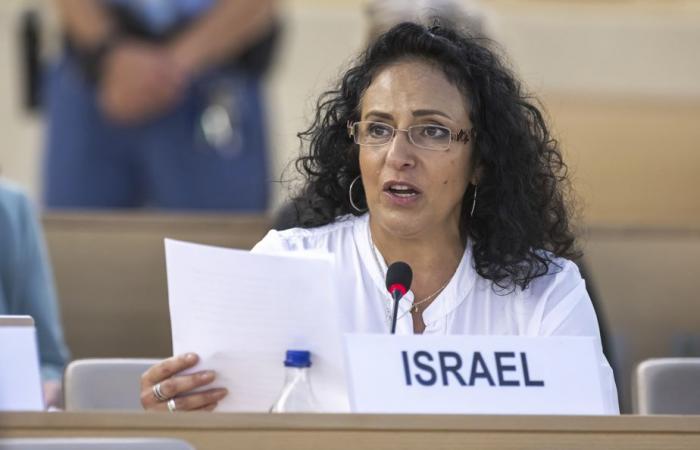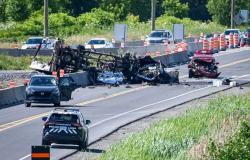(Geneva) “The hostages need us! » launched Wednesday Meirav Leshem Gonen, mother of an Israeli hostage, during a hearing at the UN of a commission of inquiry accusing Israel of crimes against humanity and Hamas of war crimes.
Posted at 1:01 p.m.
Agnes PEDRERO
France Media Agency
The war in Gaza was at the heart of the concerns of the UN in Geneva for most of the day on Wednesday.
In addition to the report of a commission charged with investigating the root causes of the Israeli-Palestinian conflict discussed at the Human Rights Council, the Office of the UN High Commissioner for Human Rights reported on its “ serious concerns” about the respect of the laws of war by the Israeli army.
The report of the commission of inquiry, created since 2021, accuses Israel of crimes against humanity, but also of war crimes and considers that the Islamist movement Hamas also committed war crimes, notably on October 7.
Israel, which refuses to cooperate with investigators and accuses them of bias, has decided to have the mother of a hostage taken on October 7 testify, instead of the usual response from a diplomat.
His daughter, Romi, 23, was kidnapped while taking part in the Tribe of Nova rave party, attacked by Hamas commandos.
“Twenty-three year old girls should not be held hostage. No one should be! » declared his mother in the chamber.
“The hostages need us!” […] Please help me to hug my daughter again,” she implored, calling on the international community to come “on the same side that fights against hostage-taking.”
She also accused the UN commission of not having sufficiently taken into account the sexual violence committed “on the day of the attack and during the captivity” of the hostages.
Following this moving testimony, Palestinian Ambassador Ibrahim Khraishi remarked to the council that it would be “difficult” to bring relatives “of more than 150 families totally decimated in Gaza”. He also argued that the report showed “there was no evidence of rape” during the Hamas attack on October 7.
The president of the commission of inquiry, Navi Pillay, who was High Commissioner for Human Rights, president of the International Criminal Tribunal for Rwanda and judge at the International Criminal Court (ICC), reacted strongly to the declarations of the mother and the Palestinian ambassador on sexual violence, accusing them of not having read the report closely enough.
” Hope ”
Throughout the day, families of those killed on October 7 and of hostages gathered in the large square opposite the UN, where portraits of more than 400 of them were drawn up.
One of the investigators of the Pillay commission, Chris Sidoti, judged that it was “extremely important” that “the person who represented Israel” in the Council “was the mother of a hostage”.
“This is the first time that we had the opportunity to speak and hear directly, face to face, from one of the members of a family,” he said, facing the blockade of the Israeli authorities.
The October 7 attack resulted in the deaths of 1,194 people, the majority civilians, according to an AFP count based on official Israeli data. Of 251 people kidnapped, 116 are still held hostage in Gaza, of whom 41 are dead, according to the Israeli army.
In response, the Israeli army launched an offensive on the Gaza Strip, killing 37,396 people so far, mostly civilians, according to data from the Gaza government’s Health Ministry.
Mr. Sidoti said he understood that “the events of October 7 and what has happened since are deeply traumatic” for Jews in Israel and for Palestinians and their respective diasporas.
“However, my own experience of apartheid in South Africa and the fact that we ended it […] fills me with hope,” observed M.me Pillay.
When asked if the October 7 attack was indeed the starting point of the current war, investigators stressed that it was not born out of a vacuum, but rather the result of a long history of clashes. and tensions.
Without making a direct link, Mme Pillay, however, stressed that Nelson Mandela, the great architect of the end of apartheid in South Africa, had himself been described as a “terrorist” before becoming a symbol of freedom admired and respected throughout the world.






